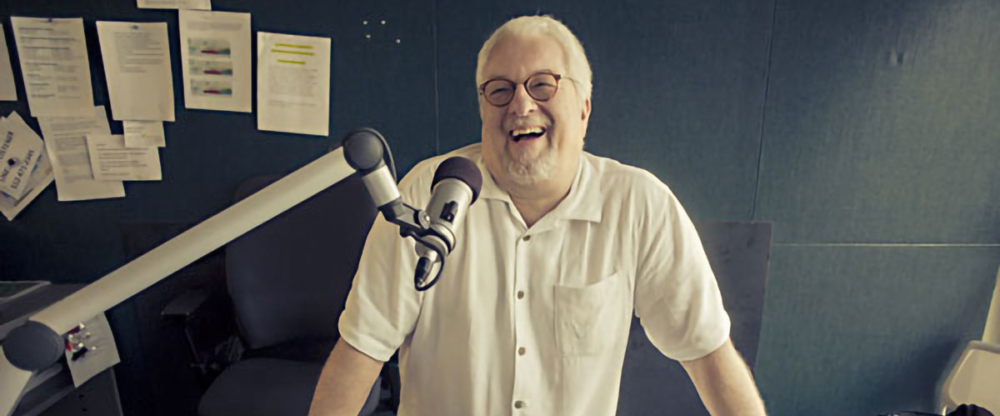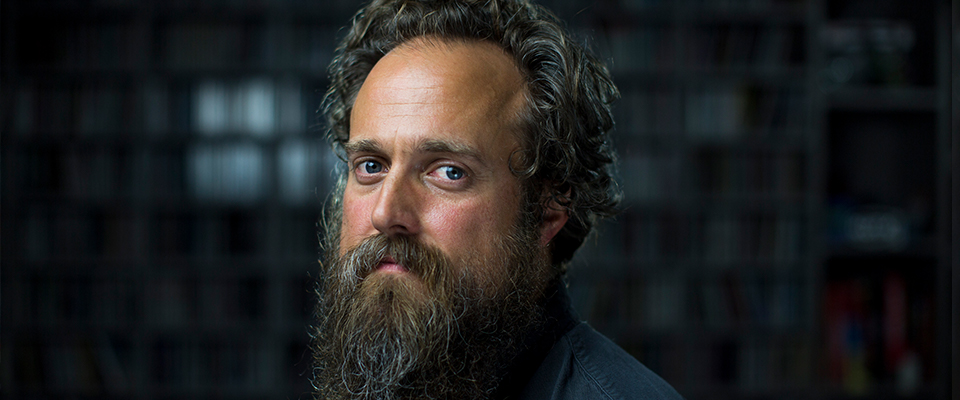Longtime host of ‘Horizontes’ and ‘Global Grooves’ will host his final program on June 30th
By Jeff McCord
In this blessed musical oasis of Austin, there are certain things we all take for granted. In any given week, there will be an amazing array of live musical choices. And on Sunday nights, Michael Crockett will be our KUTX tour guide through the music of Latin America and the rest of the globe.
Yet on June 30th, Michael signs off for good as host of ‘Horizontes’ and ‘Global Grooves’. His retirement marks the end of an era here at KUT/X.
Pushing seventy, Michael is feeling the tug of travel, and the need to step away from the bonds of incessant weekly scheduling. He has been the host of ‘Horizontes’ (the music of Latin America) for a staggering 35 years, and has manned the helm of his other program (encompassing the rest of the planet), ‘Global Grooves’, for another 18.
For decades, his programs have been grouped geographically, painstakingly researched and curated with a musicologist’s knowledge and passion. Yet his origins are almost as unlikely as his long tenure.
When I ask him to start at the beginning, he sighs.
“Oh, man. I’m from Lubbock. My family moved to Houston when I was five years old, something like that. I graduated from high school out of Houston, and. I came to UT in 1972.”
Michael is not Hispanic. “I can’t remember exactly when this crazy Latin thing hit me,” he explains, “but I’d always liked Latin music because my father was a fan of Sergio Mendez. I always thought, ‘that’s cool stuff’. But of course, the Beatles took over, the Grateful Dead and everything else. So I forgot all about it.”
Michael and UT didn’t take the first time around, either. He dropped out after a year, traveled around and embarked on his self-described “VW van phase”.
“I was a total hippie,” he confesses. “It was everything psychedelic. I just traveled constantly. Finally I came back to town and said, ‘I think I better get a degree’.”
But before re-enrolling at UT, it was Austin DJ Kerry Dawson who gave Michael a seminal piece of his education. Dawson put on Brazilian star Milton Nascimento’s 1976 album Milton.
“This thing just blew my mind.”
From early grade school on, Michael had shown he had an ear for the Spanish language.
“My father loved to go dove hunting in northern Mexico, and he used to take my mom down to these little ranches down there. So one day they took the kids. And my father was so happy that he had a translator with him. I translated basic things for him, like, he wanted a cerveza and he wanted comida. I just loved the language.”
Nascimento, of course, spoke Portuguese, but Michael could make out enough to understand that Nascimento was much more than just a talented musician. He was also a poet, a storyteller. The hook, as they say, was in.

“When I heard Milton Nascimento and I heard Portuguese, I said, ‘damn, I want to know this language because I think I can get it’. So I started taking Portuguese, and the next thing you know, I’m in Latin American studies. Now I’m taking history and culture.”
Michael found his musical tastes diverging wildly from his peers.
“It’s funny,” he admits, “when people ask me about music in the 80s, I mean, I watched MTV, so I know something, but that’s about it. I jumped off completely and through Latin American studies, I became aware of the new song movement, what they call the nueva cancion. That was like the folk revival that we had in the States. It was essentially the same.”
He was also absorbing the ‘culture’ of the UT drag.
“I had a music habit, of course, and I worked across the street at Discount Records. You could get records for wholesale when you worked there. I could listen to them beforehand, and I always wanted the Sunday shift because nobody wanted to hear what I wanted to play in the store. Nobody would be in the store and I could play whatever I wanted.”
It was around this time that Michael first became aware of the KUT program ‘Horizontes’ and the host of the program, John Wheat.
“In those days that show was on every day, the way I remember it. Earlier in the week, there was Mexico, and then you would kind of travel each day to a different part of Latin America.”
Michael became a fan of the program. He would see John Wheat DJing at local Salsa nights. And he worked alongside a pair of KUT DJ’s at his record store job, Mike Quinn and Tom Skouras. When John Wheat’s day job obligations started increasing, Quinn convinced Wheat to let him take over a Friday ‘Horizontes’ featuring the music of Brazil. (Brazilian music was a passion of Quinn’s. Quinn also staged the annual ‘Carnival Brasilero’ Austin dance party for many years).
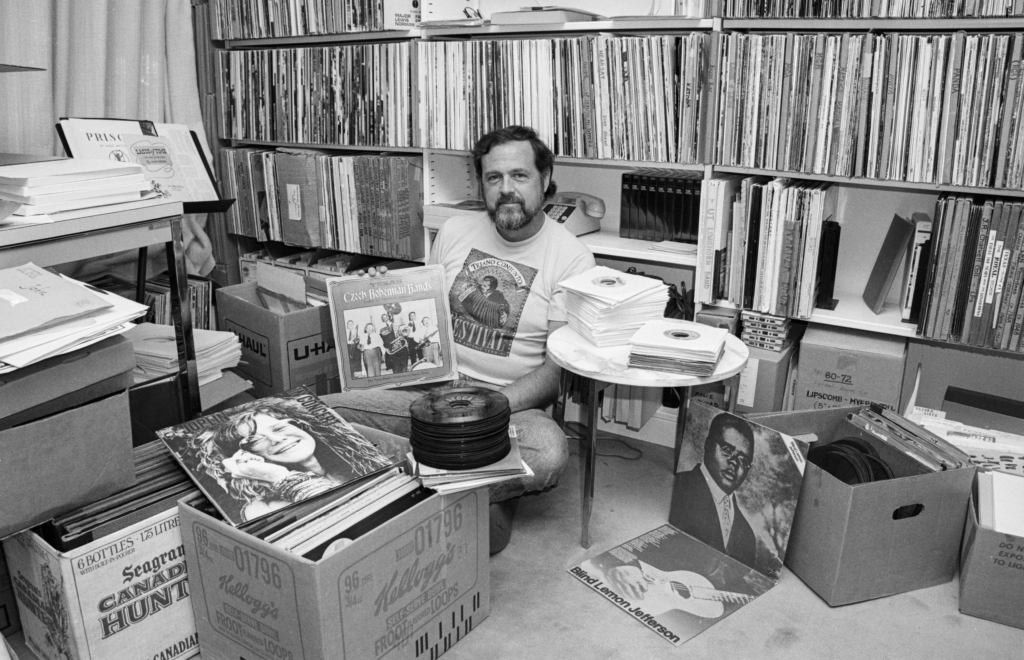
And another convergence was taking place.
“I had an anthropology course,” Michael explains, “and I had to do a study of subculture in Austin. So I chose the Latin salsa scene. Who was my main contributor? John Wheat. So I come up [to KUT] and hang with him. Of course, I always thought, ‘Oh, it’d be great to do that show’.”
Wheat, Quinn and Skouras all put the notion in Michael’s head that he could become a fill-in host at KUT. Michael took a radio production class at UT, and eventually, gets asked to fill-in on a few KUT programs, starting, he remembers with ‘Folkways’. Meanwhile, John Wheat was having trouble managing his other work with his Monday through Thursday ‘Horizontes’ hosting duties, and decided to step away from the program. Another host, Lina Del Roble, took over for a time, but when she left, programming decisions cut ‘Horizontes’ down to Fridays only, Mike Quinn’s Brazilian slot. When Quinn decided to move to Brazil in 1988, Michael took over the Friday program full-time.
By this point he had completed his undergraduate work in Latin American studies. A record distributor at Discount Records told Michael he was leaving his job and offered it to him.
“I was looking at my undergraduate degree and figured out pretty quickly that my job prospects were not that good. I was going to have to get a master’s if I wanted to be in the diplomatic corps, which was sort of my dream. I didn’t want to work at a record store the rest of my life. I’m getting older and needed money.”
So Michael accepted the job, at first for one distributor, then as a contractor for several, ending up at one company for twenty years. He would travel, cover four to five states, work the telephones. But he had also stepped into a position tailor-made for his other work in radio: flexible hours and access to lots of Latin American recordings. All this proved helpful as he took over ‘Horizontes’, an established program with loyal listeners.
“I’m sure I was intimated at first,” Michael recalls, “because of what every deejay goes through when they take over a show. I felt pretty knowledgeable, and I had the content. At that point, the station library was not that great of a resource. Nobody was servicing the station with Latin music. My involvement in the music business helped me a lot because I worked for two import companies.”

And he had an academic outlook on Latin America, a deep understanding of the countries and their cultures. He couldn’t wait to pass this on. There was one problem: because of the way ‘Horizontes’ had evolved, the Friday afternoon program only featured the music of Brazil.
Slowly, Michael began to introduce the music of more Latin American countries into the mix.
‘I think some people were a little upset when I restored the Spanish content. Brazilians are like Texans. They’re really proud. [But] that was something I wanted to do. Essentially I had two hours to work with in those days. And I can look at my playlists over the years and I can see how I transitioned. At some point, I was given three hours on Friday, [and] I made the division in my mind. If I started with Samba [Brazil] and ended with Salsa [Caribbean] and I put the rest of Latin American in between, it would be just right. And I pretty much kept that formula.”
Michael Crockett’s ‘Horizontes’ became destination programming and held down the Friday afternoon slot for decades, through the transition KUT’s music programming to KUTX.
Michael’s curated approach proved a perfect match for KUT..
“I thought of KUT, in those days especially, as an educational radio station: being entertaining, but also being informational about these cultures. I always worked that way. I followed a geographical sequence in the show, and tried to impart that knowledge. You’ve got to be a little short-winded. Nobody wants to hear me talk forever, and I can do that. It had to be entertaining. It couldn’t stay folkloric. In the Spanish side of Latin America, the folk movement was really resurgent. A lot of instrumentation was folkloric. But essentially it rose to the level of pop music – and it was popular.”
Another successful program bringing modern world music to listeners was Dan Del Santo’s ‘World Music Show’, which brought a blend of Afro-Beat, reggae and calypso to listeners on Friday nights in the eighties. A brush with the law forced Del Santo to leave the country, and for a time a rotating trio of world music hosts took over: Hayes McCauley, Angela Miller and Michael Crockett. This is where Michael first introduced his “Global Grooves”, mining the musical beats around the rest of the world.
Eventually, KUTX programming changes shifted ‘Horizontes’ and other world music programming to Sunday evenings. When Hayes McCauley decided to step away during the pandemic, Michael’s “Global Grooves” resurfaced in his place. Michael has been researching and curating three to five hours of world music on Sunday nights ever since.
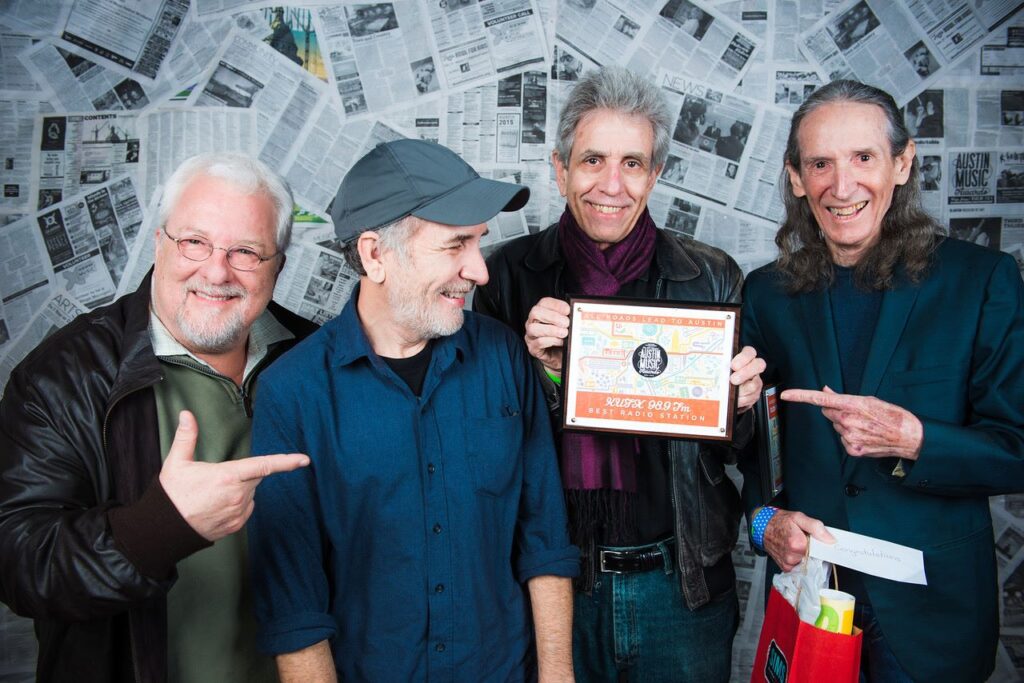
On June 30th, his tenure comes to an end.
“I need to relax for a few years,” he confesses. “I need to travel. We went into this pandemic thing where I could produce my shows at home, I traveled a bit and produced shows. I thought I could do this, but man, you know, it’s that deadline.”
Asked to single out a few of his proudest moments, I watch him mentally scan the decades. He speaks with admiration of the Austin musicians presenting international music.
“Every year before the Chronicle music poll, I ran a complete show of Austin artists and on both shows, enough music to do five hours of Latin and world music in Austin. That was pretty cool.”
(Michael is among their ranks. Years ago he played in a folkloric group, Toqui Amaru. He now plays in a band called Panama Hats with former ‘Horizontes’ host John Wheat and retired NPR reporter John Burnett.)
And a few other key moments bob up in his memory.
He mentions a 1986 Milton Nascimento show he invested in with Waterloo Records’ Louis Karp and John Kunz, how it made him enough money to tour Latin America for the first time.
And…
“When we had Omara Portuondo and Eliades Ochoa [both of the Buena Vista Social Club revival] in for ‘Live Set’ [KUT’s live music program],” he recalls. “That was special. [Omara] was great fun. This 85 year old woman was flirting with me, just going on. That was a sweet moment.”
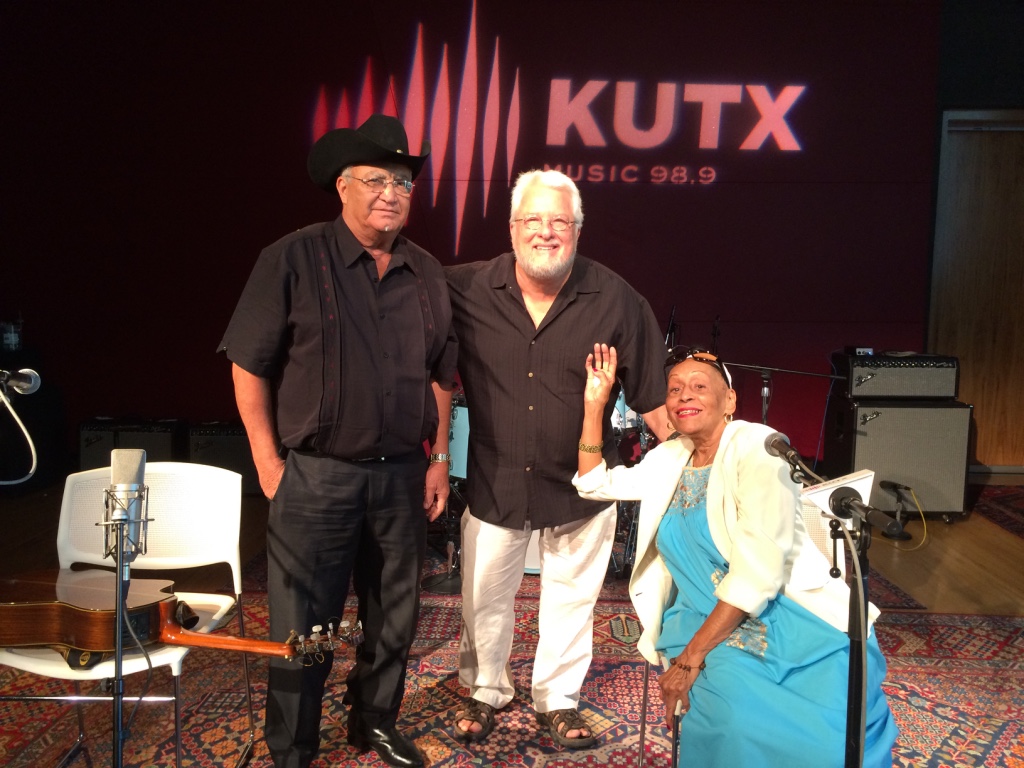
“The first time I introduced Lila Downs. I had become friends with her, watched her career grow. She became a huge artist in Mexico and pretty much internationally. And I introduced her at the Paramount. That was a moment for me.”
He goes on.

“It’s hard for me to, say, certain interviews I’ve done. I interviewed Ruben Blades in 2019. There was an interview I did with Jorge Drexler that is one of the most beautiful hours I’ve ever spent in my life. He’s an incredible songwriter and a damn good guitar player. He played several of his songs, one in particular about terrorism and Middle East conflicts. He’s of Jewish descent, but grew up in Uruguay. It’s a very poignant song. And then of all things he pulls out a Leonard Cohen song, ’Dance Me to the End of Time’. And he did it in a rhythm called a milonga. To this day, it just [gives me] goosebumps. Recently, after all these years of wanting to play live here, ACL books him and then he gets to play at the Paramount, too.”
He’s undoubtedly forgetting others. In radio for as long as Michael has been, it becomes about the day to day act, the excited premieres to audiences similar to the ones he once presented for his friends by playing records in his home. It’s about the music that seeps into your blood and never leaves.
Michael has a long goodbye scheduled over five Sundays in June. Here’s his announcement:
“I’m presenting a retrospective of both the Horizontes and the World Music/Global Grooves programs by playing music from five decades of Latin and World music programming on KUT/X. You’ll hear songs played by former hosts John Wheat, Lina Del Roble, and Mike Quinn on Horizontes from before I became the host in 1989 and many of my favorites since then. You’ll also hear songs played by former World Music hosts Dan Del Santo, Angela Miller and Hayes McCauley as well as my favorites from when Global Grooves debuted in 2006. If you can’t catch the shows on Sunday remember you can hear archive editions on the KUTX website at www.kutx/programs.”
Michael Crockett, KUTX Host
Through our archives, Michael’s programs will endure. But they’re already branded into the collective memories of long-time Austinites; the rhythms, the pathways, the exploring, the thrill of discovery.
World music programming will continue on KUTX (more on that later). While Michael is off for some much-needed R&R, no one will be surprised if he resurfaces in some way or form in the future. Walking away was not a decision he made easily. He’s leaving the door open for future things like a possible podcast, a scripted historical program he might produce. But that’s down the road. In the meantime, that kid that first heard the Milton Nascimento record is still there.
Michael might be leaving behind his radio career, but he sums it all up as well as anyone.
“I can’t get rid of the passion.”
